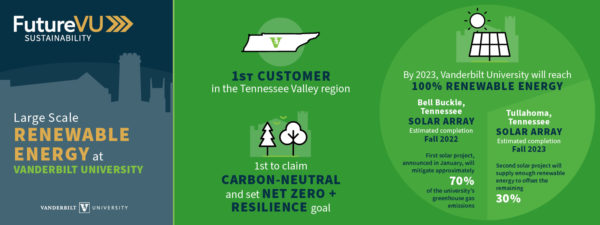
Vanderbilt University and the city of Nashville, Tennessee, have announced a Green Invest partnership with the Tennessee Valley Authority and Nashville Electric Service—a collaboration that will allow the region to take a bold step forward in expanding availability and access to renewable energy at a critical time in global efforts to address the threat of climate change.
Through this new partnership, Vanderbilt is tackling climate change head-on by working towards its goal of powering its campus entirely through renewable energy and committing to carbon neutrality.
“We hope this groundbreaking partnership between government, business, and universities will be a model of innovative collaboration to address the most important issues of our time,” said Chancellor Daniel Diermeier.
The renewable power for Vanderbilt and Nashville will come from a solar farm to be built in Tullahoma, Tennessee, by Nashville-based Silicon Ranch Corporation. This marks the university’s second solar project with TVA, NES and Silicon Ranch through TVA’s Green Invest program. Vanderbilt will be a 25-megawatt co-subscriber to the array for campus operations.
Vanderbilt will reach its renewable energy goal just over four years after the university made its initial commitment in 2019. Vanderbilt’s initial partnership, announced in January 2020, will mitigate approximately 70 percent of the university’s annual indirect greenhouse gas emissions by fall 2022. The second Green Invest project will supply enough renewable energy to offset the remaining 30 percent of the university’s annual indirect greenhouse gas emissions from purchased electricity by fall 2023.
The agreement is also anticipated to provide hundreds of new jobs during the construction of the solar project as well as unique educational and research opportunities for the Vanderbilt community with both solar farm locations within close proximity to the Nashville area.
Vanderbilt investigated ways it could invest in renewable energy through its BlueSky Vision Study, a 10-month study carried out by the BlueSky Vision Executive and Advisory Committees. These committees studied the implementation of a comprehensive renewable energy plan through energy conservation, production of on-site clean and renewable energy, procurement of off-site renewable energy to mitigate campus greenhouse gas emissions and sufficient storage of clean energy to provide the campus with energy resilience.
Additionally, a Large-scale Renewable Energy Study was conducted with input from the Large-Scale Renewable Energy Study Advisory Committee. The committee explored potential options for off-campus large-scale renewable energy sources.
“The studies conducted prior to reaching the agreement are an outstanding example of Vanderbilt’s commitment to collaboration in all we do, and brought together faculty, staff and students to solve real-world problems associated with climate change,” said Diermeier.
Nashville Mayor John Cooper, who has been promoting sustainability through multiple city initiatives, said the partnership is a win-win for the city and Vanderbilt, which continues to be a statewide economic driver and partner in education, employment and healthcare.
“I’m proud to partner with Vanderbilt University and am grateful for their leadership in helping make this Green Invest project possible,” said Cooper. “Vanderbilt’s commitment to stewardship of our shared environment is helping us all build a healthier, more sustainable Nashville. As mayor, I see tremendous value in private-public partnerships like these and hope other organizations will embrace this model.”
“This is an important step forward as we accelerate our carbon neutrality plan and set a net positive goal for on-campus and purchased power,” said Eric Kopstain, vice chancellor for administration. “Our expanded partnership with the Nashville community is the result of two years of intensive effort to identify the best renewable energy strategy for Vanderbilt on the basis of key criteria that include financial, social and environmental benefits and risk mitigation.”
“It is great to see Vanderbilt follow through on its climate commitments and its leading role in climate research,” said Mike Vandenbergh, David Daniels Allen Distinguished Chair in Law and director of the Climate Change Research Network. “The momentum for renewable power is growing in this region, and this collaboration will help the area remain economically competitive.”
The new solar farm project is scheduled for completion in 2023.
Learn more about the university’s sustainability efforts.